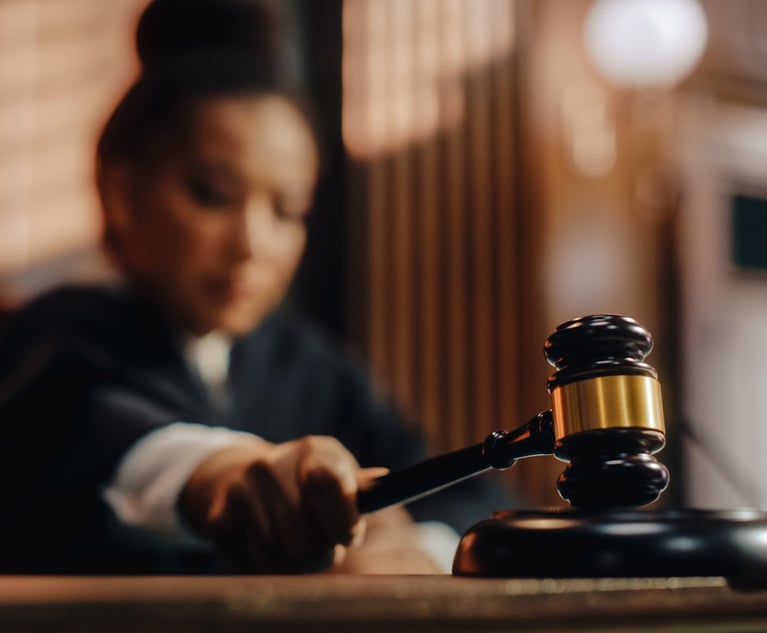Immunity Revoked for Firearms Instructor Who Shot and Killed Trooper
The Third Circuit has ruled that a former Pennsylvania State Police firearms instructor who allegedly disregarded multiple safety measures and ultimately shot and killed a fellow trooper during training is not immune from a lawsuit brought by the deceased trooper's mother.
November 28, 2017 at 03:21 PM
5 minute read

The U.S. Court of Appeals for the Third Circuit has ruled that a former Pennsylvania State Police firearms instructor who allegedly disregarded multiple safety measures and ultimately shot and killed a fellow trooper during training is not immune from a lawsuit brought by the deceased trooper's mother.
A three-judge panel consisting of Third Circuit Judges Cheryl Ann Krause and D. Michael Fisher, along with visiting Eighth Circuit Judge Michael J. Melloy, overturned an Eastern District of Pennsylvania judge's ruling that former Cpl. Richard Schroeter was entitled to qualified immunity as a state employee.
Joan Kedra, mother of Trooper David Kedra, sued Schroeter for civil rights violations under the state-created danger theory. According to Krause's opinion, Schroeter skipped over several safety checks, included checking to see if the gun was loaded, aiming at a person instead of at a target, and then pulling the trigger.
Eastern District Judge Eduardo Robreno dismissed the case and granted immunity to Schroeter on the basis that Kedra's complaint pleaded only an “objective theory of deliberate indifference” or what a ”reasonable official should have known because the risk was so obvious, which was not then-clearly established, and was insufficient to plead the clearly established subjective theory of deliberate indifference, i.e., that Schroeter was actually aware that his conduct carried a substantial risk of serious harm.”
The court agreed with Robreno that the objective theory of deliberate indifference was not clearly established at the time of the accident. But Krause added that “because obviousness of risk is relevant to proving actual knowledge and the allegations of the complaint here were more than sufficient to support a reasonable inference that Schroeter had such knowledge, we conclude the complaint adequately pleads a state-created danger claim under a then-clearly established theory of liability.”
Michael J. Quirk of Williams Cuker & Berezofsky, who represents Kedra, said in an email: ”We are very pleased with the Third Circuit's decision. The court got all of the qualified immunity issues exactly right. The Kedra family now will finally have their day in court.”
Kevin R. Bradford of the state Attorney General's Office did not respond to a request for comment.
In addition to Krause's opinion, Fisher issued a concurrence. In it, he agreed with the overall ruling, but said Robreno's decision should have been reversed on “narrower grounds.”
“I would limit this decision to the narrowest possible grounds, and would reverse solely because of the allegation that Schroeter pleaded guilty to recklessly endangering another person in Pennsylvania court. I do not believe that the other allegations on which the majority relies are sufficient—separately or together—to state a claim,” Fisher said.

The U.S. Court of Appeals for the Third Circuit has ruled that a former Pennsylvania State Police firearms instructor who allegedly disregarded multiple safety measures and ultimately shot and killed a fellow trooper during training is not immune from a lawsuit brought by the deceased trooper's mother.
A three-judge panel consisting of Third Circuit Judges
Joan Kedra, mother of Trooper David Kedra, sued Schroeter for civil rights violations under the state-created danger theory. According to Krause's opinion, Schroeter skipped over several safety checks, included checking to see if the gun was loaded, aiming at a person instead of at a target, and then pulling the trigger.
Eastern District Judge Eduardo Robreno dismissed the case and granted immunity to Schroeter on the basis that Kedra's complaint pleaded only an “objective theory of deliberate indifference” or what a ”reasonable official should have known because the risk was so obvious, which was not then-clearly established, and was insufficient to plead the clearly established subjective theory of deliberate indifference, i.e., that Schroeter was actually aware that his conduct carried a substantial risk of serious harm.”
The court agreed with Robreno that the objective theory of deliberate indifference was not clearly established at the time of the accident. But Krause added that “because obviousness of risk is relevant to proving actual knowledge and the allegations of the complaint here were more than sufficient to support a reasonable inference that Schroeter had such knowledge, we conclude the complaint adequately pleads a state-created danger claim under a then-clearly established theory of liability.”
Michael J. Quirk of Williams Cuker & Berezofsky, who represents Kedra, said in an email: ”We are very pleased with the Third Circuit's decision. The court got all of the qualified immunity issues exactly right. The Kedra family now will finally have their day in court.”
Kevin R. Bradford of the state Attorney General's Office did not respond to a request for comment.
In addition to Krause's opinion, Fisher issued a concurrence. In it, he agreed with the overall ruling, but said Robreno's decision should have been reversed on “narrower grounds.”
“I would limit this decision to the narrowest possible grounds, and would reverse solely because of the allegation that Schroeter pleaded guilty to recklessly endangering another person in Pennsylvania court. I do not believe that the other allegations on which the majority relies are sufficient—separately or together—to state a claim,” Fisher said.
This content has been archived. It is available through our partners, LexisNexis® and Bloomberg Law.
To view this content, please continue to their sites.
Not a Lexis Subscriber?
Subscribe Now
Not a Bloomberg Law Subscriber?
Subscribe Now
NOT FOR REPRINT
© 2025 ALM Global, LLC, All Rights Reserved. Request academic re-use from www.copyright.com. All other uses, submit a request to [email protected]. For more information visit Asset & Logo Licensing.
You Might Like
View All
'Discordant Dots': Why Phila. Zantac Judge Rejected Bid for His Recusal
3 minute read
Phila. Court System Pushed to Adapt as Justices Greenlight Changes to Pa.'s Civil Jury Selection Rules
5 minute read
Pa. Appeals Court: Trial Judge Dismissed Med Mal Claims Without Giving Plaintiffs Proper Time to Fight Back
4 minute read
Phila. Judge Upholds $68.5M Verdict Over Construction Worker's Death
3 minute readTrending Stories
Who Got The Work
Michael G. Bongiorno, Andrew Scott Dulberg and Elizabeth E. Driscoll from Wilmer Cutler Pickering Hale and Dorr have stepped in to represent Symbotic Inc., an A.I.-enabled technology platform that focuses on increasing supply chain efficiency, and other defendants in a pending shareholder derivative lawsuit. The case, filed Oct. 2 in Massachusetts District Court by the Brown Law Firm on behalf of Stephen Austen, accuses certain officers and directors of misleading investors in regard to Symbotic's potential for margin growth by failing to disclose that the company was not equipped to timely deploy its systems or manage expenses through project delays. The case, assigned to U.S. District Judge Nathaniel M. Gorton, is 1:24-cv-12522, Austen v. Cohen et al.
Who Got The Work
Edmund Polubinski and Marie Killmond of Davis Polk & Wardwell have entered appearances for data platform software development company MongoDB and other defendants in a pending shareholder derivative lawsuit. The action, filed Oct. 7 in New York Southern District Court by the Brown Law Firm, accuses the company's directors and/or officers of falsely expressing confidence in the company’s restructuring of its sales incentive plan and downplaying the severity of decreases in its upfront commitments. The case is 1:24-cv-07594, Roy v. Ittycheria et al.
Who Got The Work
Amy O. Bruchs and Kurt F. Ellison of Michael Best & Friedrich have entered appearances for Epic Systems Corp. in a pending employment discrimination lawsuit. The suit was filed Sept. 7 in Wisconsin Western District Court by Levine Eisberner LLC and Siri & Glimstad on behalf of a project manager who claims that he was wrongfully terminated after applying for a religious exemption to the defendant's COVID-19 vaccine mandate. The case, assigned to U.S. Magistrate Judge Anita Marie Boor, is 3:24-cv-00630, Secker, Nathan v. Epic Systems Corporation.
Who Got The Work
David X. Sullivan, Thomas J. Finn and Gregory A. Hall from McCarter & English have entered appearances for Sunrun Installation Services in a pending civil rights lawsuit. The complaint was filed Sept. 4 in Connecticut District Court by attorney Robert M. Berke on behalf of former employee George Edward Steins, who was arrested and charged with employing an unregistered home improvement salesperson. The complaint alleges that had Sunrun informed the Connecticut Department of Consumer Protection that the plaintiff's employment had ended in 2017 and that he no longer held Sunrun's home improvement contractor license, he would not have been hit with charges, which were dismissed in May 2024. The case, assigned to U.S. District Judge Jeffrey A. Meyer, is 3:24-cv-01423, Steins v. Sunrun, Inc. et al.
Who Got The Work
Greenberg Traurig shareholder Joshua L. Raskin has entered an appearance for boohoo.com UK Ltd. in a pending patent infringement lawsuit. The suit, filed Sept. 3 in Texas Eastern District Court by Rozier Hardt McDonough on behalf of Alto Dynamics, asserts five patents related to an online shopping platform. The case, assigned to U.S. District Judge Rodney Gilstrap, is 2:24-cv-00719, Alto Dynamics, LLC v. boohoo.com UK Limited.
Featured Firms
Law Offices of Gary Martin Hays & Associates, P.C.
(470) 294-1674
Law Offices of Mark E. Salomone
(857) 444-6468
Smith & Hassler
(713) 739-1250





